Custom Ceramic Terminal Block Manufacturer in China
Our ceramic terminal blocks provide exceptional high-temperature resistance and superior electrical insulation for demanding applications. They’re ideal for ovens, heaters, and other environments where standard plastic terminals fail. Choose our ceramic blocks for reliable, long-lasting connections in extreme conditions.
Linkwell Electrics - Your Trusted Ceramic Terminal Block Manufacturer from China
Linkwell Electrics, a trusted terminal block manufacturer from China, specializes in high-quality ceramic terminal blocks. Our products offer superior heat resistance and electrical insulation, making them perfect for industrial ovens, heating systems, and challenging environments. With certifications like CE and UL, Linkwell Electrics ensures reliable and durable connections for your most demanding applications.
Various Ceramic Terminal Block
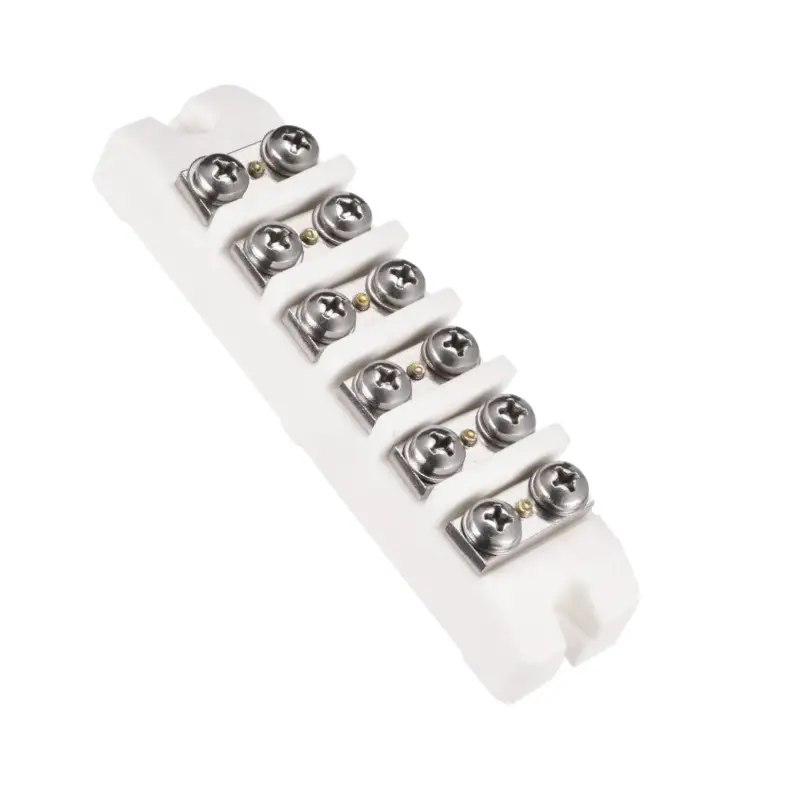
ceramic terminal blocks
We offer wholesale ceramic terminal blocks, providing reliable and high-temperature electrical connections for various industries. Our bulk options ensure cost-effectiveness for your projects requiring durable, heat-resistant solutions. Available in multiple pole configurations and amperage ratings, our ceramic blocks are ideal for ovens, industrial heating, and applications where extreme conditions are present.
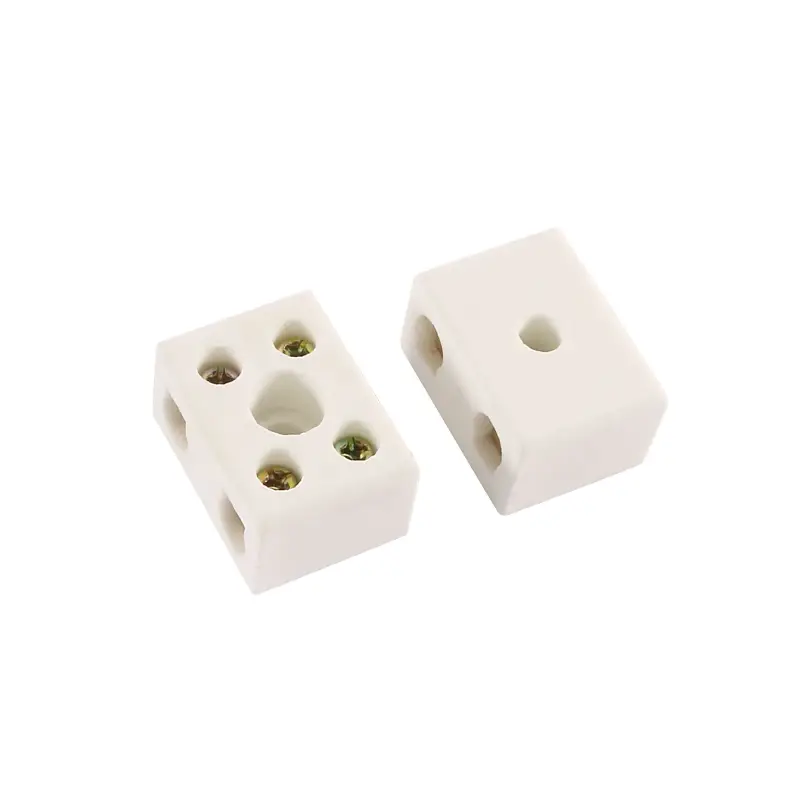
ceramic terminal blocks high temperature
We offer ceramic terminal blocks engineered for extreme temperatures, providing reliable electrical connections where conventional materials fail. Constructed from high-frequency porcelain or steatite, they resist heat up to 1000°C (1832°F) and offer excellent insulation. Ideal for industrial ovens, furnaces, kilns, and other demanding high-temperature applications.
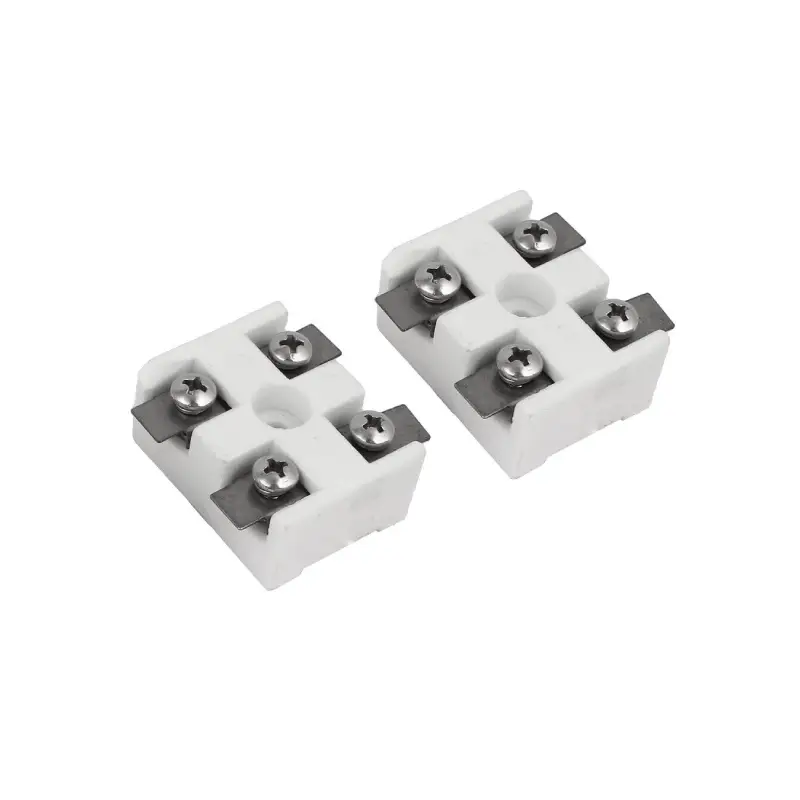
ceramic terminal block 2 pole
We offer 2-pole ceramic terminal blocks, perfect for applications requiring robust electrical connections in extreme temperatures. These blocks provide excellent insulation and heat resistance, ensuring reliable performance in furnaces, industrial heaters, and high-temperature machinery. Trust our 2-pole ceramic terminal blocks for secure and durable wiring solutions.
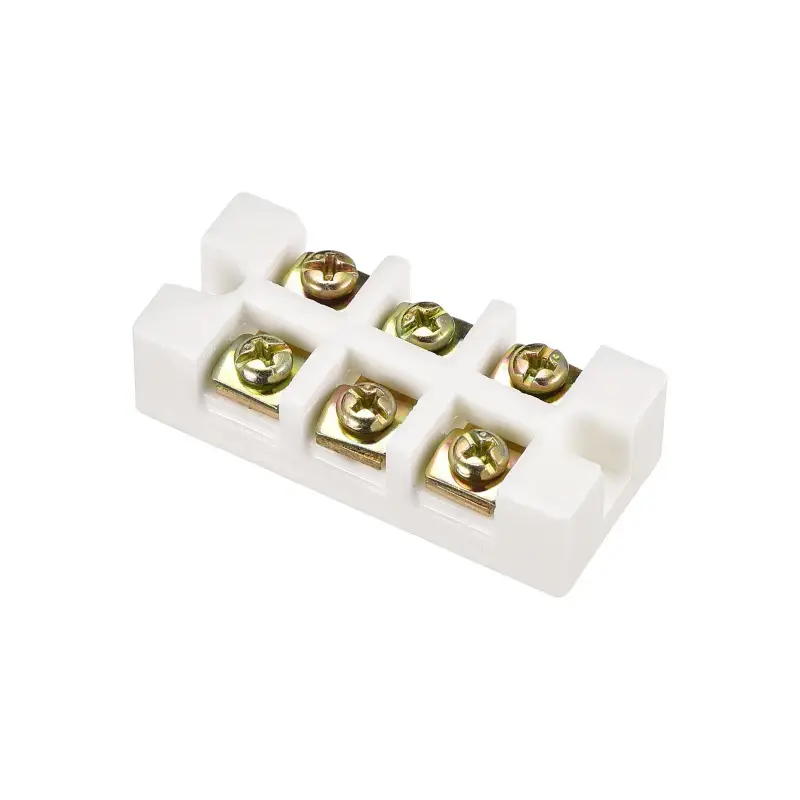
ceramic terminal block 3 pole
We offer robust 3-pole ceramic terminal blocks, essential for high-temperature electrical connections. These blocks provide excellent insulation and withstand extreme heat up to 800°C. Ideal for industrial ovens, heating elements, and other demanding applications, our 3-pole ceramic terminals ensure secure and reliable wiring for your critical systems.
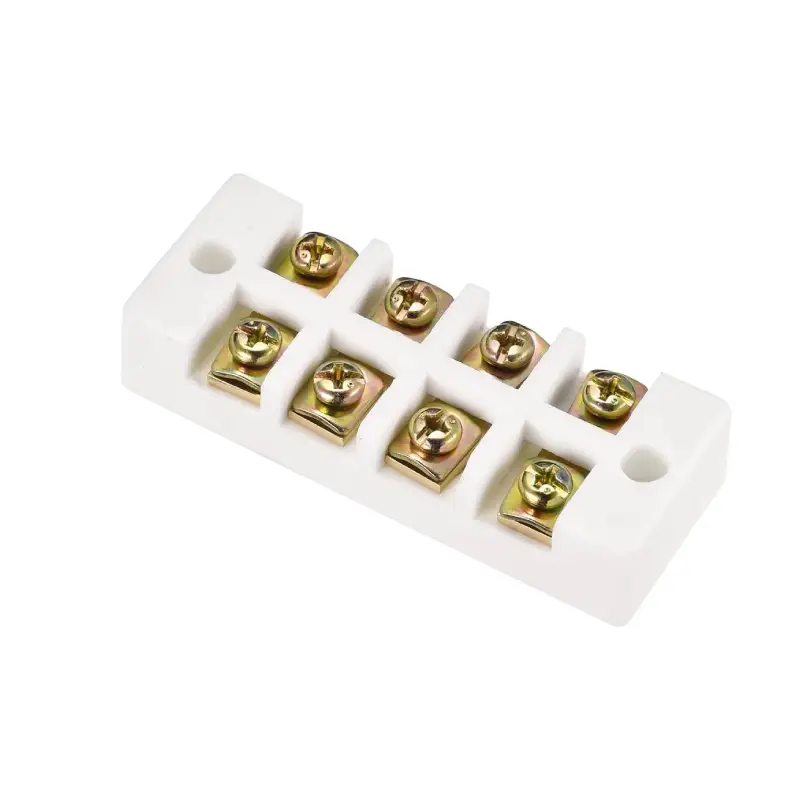
ceramic terminal block 4 pole
We offer 4-pole ceramic terminal blocks designed for robust electrical connections in extreme conditions. These blocks provide excellent insulation and withstand temperatures up to 800°C, making them ideal for furnaces, kilns, and industrial heating applications. Their durable ceramic construction ensures reliable and safe wiring in demanding environments.

ceramic terminal block 6 pole
We offer robust 6-pole ceramic terminal blocks, engineered for multi-wire connections in high-temperature environments. These blocks provide excellent insulation and thermal stability, ensuring reliable performance where plastics fail. Ideal for industrial ovens, heating elements, and machinery, our 6-pole ceramic terminals deliver secure and durable electrical connections for complex circuits.
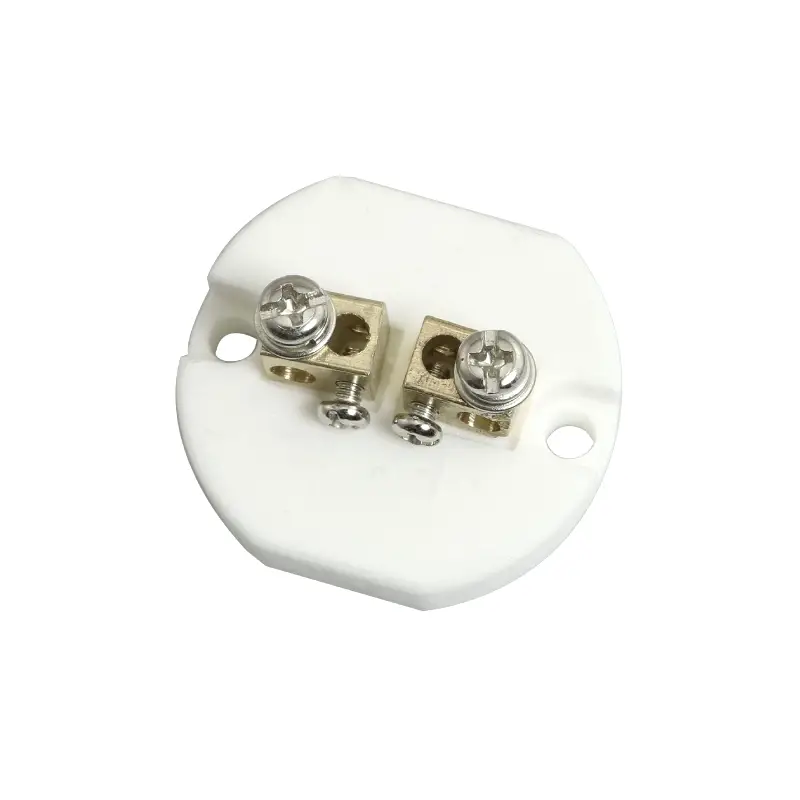
ceramic thermocouple terminal block
We offer specialized thermocouple ceramic terminal blocks, essential for accurate temperature sensing in high-heat environments. These blocks are crafted from high-quality ceramic, ensuring exceptional insulation and thermal stability. They are designed to prevent signal interference and withstand extreme temperatures, guaranteeing reliable and precise thermocouple connections for critical industrial applications.
Customize Your Ceramic Terminal Block
Number of Poles/Positions
We can customize the number of connection points on your ceramic terminal block. Whether you need a simple single-pole connection or a multi-way configuration for complex wiring, we design blocks to precisely match your circuit requirements, optimizing space and simplifying installation.
Terminal Type and Material
We offer various terminal types, including screw and push-in designs, to suit your preferred wiring method. Furthermore, we can use specific metal alloys like brass or stainless steel for the conductive parts, ensuring optimal conductivity and corrosion resistance for your operating environment.
Physical Dimensions and Mounting
We can tailor the overall size, shape, and mounting features of the ceramic block. This includes specific length, width, height, and hole configurations, allowing for perfect fitment within existing enclosures or specialized equipment, simplifying assembly and reducing manufacturing costs.
Voltage and Current Ratings
We can engineer ceramic terminal blocks to meet precise voltage and current requirements for your specific application. This ensures safe and efficient power transmission, preventing overload and ensuring the longevity of your electrical systems even in demanding industrial settings.
what is a ceramic terminal block?
A ceramic terminal block is an electrical connector primarily used in high-temperature environments where traditional plastic terminal blocks would melt or degrade. Made from materials like porcelain or steatite, these blocks offer exceptional heat resistance, superior electrical insulation, and robust mechanical strength.
They feature conductive terminals, often brass or nickel-plated steel, secured within the ceramic body, allowing for reliable and safe connections of electrical wires.
Their non-flammable nature and resistance to corrosion make them ideal for applications such as industrial ovens, furnaces, heaters, and thermocouple wiring, ensuring stable power distribution and signal integrity in extreme conditions.
ceramic terminal block benefits
Ceramic terminal blocks offer distinct advantages, particularly in environments where conventional plastic alternatives simply cannot perform. Their primary benefit lies in their ability to withstand extreme temperatures, often ranging from 200°C up to several hundred degrees Celsius.
This makes them indispensable for applications like industrial ovens, heating elements, and process machinery where continuous high heat would cause other materials to melt, deform, or even ignite.
Beyond temperature resistance, ceramic terminal blocks provide a host of other crucial benefits:
- Superior Electrical Insulation: Ceramic materials possess excellent dielectric properties, maintaining high insulation resistance even at elevated temperatures. This prevents electrical leakage and ensures safe, stable connections in high-voltage applications.
- Exceptional Durability and Longevity: They are highly resistant to mechanical stress, vibration, and thermal shock, offering a long service life in harsh industrial settings. Their robust nature reduces the need for frequent replacements and maintenance.
- Corrosion and Chemical Resistance: Ceramic is inherently resistant to most chemicals and corrosive agents. This makes them suitable for use in challenging environments where exposure to various substances could degrade other materials.
- Fire Safety and Non-Flammability: Being non-combustible, ceramic terminal blocks significantly enhance fire safety. They will not ignite or contribute to the spread of flames, making them a safe choice for critical applications.
what Is ceramic terminal block used for?
Ceramic terminal blocks are specifically designed for applications where extreme temperatures, corrosive environments, or high-power demands would compromise the integrity of standard plastic connectors.
Their robust construction from materials like porcelain or steatite allows them to maintain electrical insulation and mechanical stability in conditions that would melt or ignite conventional materials.
Common uses for ceramic terminal blocks include:
- Industrial Heating Equipment: They are crucial in industrial ovens, furnaces, kilns, and other high-temperature heating systems where electrical connections must endure constant high heat.
- Heating Elements and Appliances: Used to safely terminate wiring for heating elements in various industrial and commercial appliances, preventing short circuits and ensuring operational reliability.
- Thermocouple Wiring: Essential for precise temperature measurement, ceramic blocks provide stable and insulated connections for thermocouples in challenging thermal environments, ensuring accurate signal transmission.
- High-Power and High-Voltage Applications: Due to their superior insulation properties, they are suitable for power distribution in systems with elevated voltages or currents, especially where heat generation is a concern.
- Harsh Industrial Environments: Their resistance to corrosion, chemicals, and mechanical stress makes them ideal for use in factories, processing plants, and other settings exposed to aggressive conditions.
- Fire Safety Critical Systems: In applications like fire alarm systems or emergency shutdown controls, ceramic terminal blocks ensure circuit integrity even in the event of a fire, due to their non-flammable nature.
How to choose ceramic terminal blocks?
Choosing the right ceramic terminal block is crucial for ensuring the safety, reliability, and longevity of your electrical system, especially in high-stress environments. Since ceramic blocks are specialized, a careful selection process is essential.
Here are the key factors to consider when choosing ceramic terminal blocks:
Temperature Rating: This is paramount. Determine the maximum continuous operating temperature and any potential peak temperatures your application will experience. Select a ceramic terminal block with a temperature rating that significantly exceeds this maximum, ideally by at least 20%, to provide a safety margin and account for thermal cycling. Different ceramic materials (like steatite or alumina) have varying maximum temperature capabilities.
Voltage and Current Ratings: Ensure the block’s voltage and current ratings meet or exceed your application’s requirements. Over-specifying these ratings slightly (e.g., by 25%) can also provide a buffer against unexpected load increases or voltage spikes, preventing overheating and potential failure. Consider both continuous and peak electrical loads.
Number of Poles/Positions: This refers to the number of individual connections the block can accommodate. Choose a block with the appropriate number of poles for your circuit, whether it’s a simple single connection or a complex multi-way system.
Wire Size Compatibility: Verify that the terminal block can securely accept the specific wire gauge (AWG or mm²) you will be using. Too small a terminal can lead to poor contact and overheating, while too large a terminal might not grip the wire effectively.
Terminal Type and Material:
- Terminal Type: Common types include screw terminals (most common for ceramic) and sometimes push-in. Screw terminals offer a robust, re-workable connection.
- Terminal Material: While the block is ceramic, the conductive terminals are usually brass, nickel-plated brass, or stainless steel. Brass is common, but nickel-plated brass offers enhanced corrosion resistance, and stainless steel is preferred for extremely high temperatures or corrosive chemical exposure.
Mounting Options: Consider how the terminal block will be installed. Common mounting types include panel mount (with screw holes), surface mount, or floating types that connect wires without being fixed to a surface. Ensure the chosen block’s mounting configuration is compatible with your enclosure or equipment.
Environmental Factors: Beyond temperature, assess other environmental challenges. Will the block be exposed to moisture, chemicals, oil, excessive vibration, or mechanical shock? Select a block designed to withstand these specific conditions.
Certifications and Standards: Look for relevant certifications such as UL, CE, or other industry-specific standards that confirm the product meets safety and performance requirements for your region and application.
By carefully evaluating these factors, you can select the optimal ceramic terminal block that ensures reliable and safe electrical connections in even the most demanding environments.
Send Your Inquiry Now
All-in-one Ceramic Terminal Block Solutions for Your Project
We provide comprehensive ceramic terminal block solutions, engineered for your most demanding projects. From diverse pole configurations and wire compatibility to specific terminal materials and custom dimensions, we tailor blocks to your exact needs. Our high-temperature, highly insulated ceramic solutions ensure reliable, safe connections in extreme conditions, backed by expert support for seamless integration.

